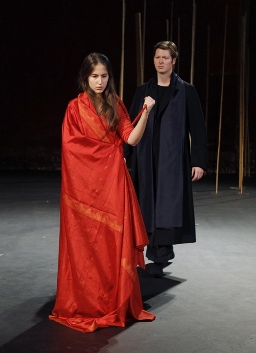A Magic Flute, CICT/Théâtre des Bouffes du Nord, Barbican Theatre | reviews, news & interviews
A Magic Flute, CICT/Théâtre des Bouffes du Nord, Barbican Theatre
A Magic Flute, CICT/Théâtre des Bouffes du Nord, Barbican Theatre
Soft-grained singers aren't all there in Peter Brook's crescent-moon Mozart
Without the definite article, what kind of a Flute is Peter Brook's - beyond, that is, the literal manifestation of a stick on a string that makes no soothing noises? Best describe it as a crescent moon of a version, loosely based on Schikaneder's text with less than half of Mozart's music and matching slivers of voices, attached to mostly fledgling stage presences. The diminishing returns of Brook's operatic deconstructions, from the bold Tragedy of Carmen through the more seriously compromised Impressions of Pelléas, here reach a dead end in a kind of bleached purgatory.
Which could hardly have been Brook's intention. Perhaps the aim was to create an evanescent dream, for without flirtatious ladies, flute-loving beasts, cherubic boys or solemn brotherhoods, Tamino's quest and Pamina's bid to join him are bound to make less sense even than usual. It all started promisingly: a soft, transfigured-night version of Mozart's overture chords from the lone pianist, two stealthy figures in a forest of yellow poles (William Nadylam, who could probably have held our attention alone on stage for the next 90 minutes with only a soundtrack to talk and move against, and Abdou Ouologuem). Then the singing began, and you could barely overhear the finer nuances of Adrian Strooper's subtle prince. There was much more reined-in energy from what little Papageno got to sing, in the very personable shape of Thomas Dolié, unquestionably the one potentially star-quality voice of the seven in the cast I heard.
But was that really supposed to be the star-blazing Queen of the Night in the presenceless shape of Malia Bendi-Merad? Would this lady have any nocturnal role beyond the agency of a human sleeping tablet, and was there any part for her in Brook's version, shorn of the battle of the sexes which can be a sticking point of the original until you realise that Pamina is there as a fast-developing representative of forceful femininity to add sisters to Sarastro's brotherhood? Another problem there: Jeanne Zaepffel is sweet 19, not much older than Nannina Gottlieb who created the role of Pamina in 1791. But Gottlieb must have had some technique to get round the more generous phrases. Zaepffel doesn't, and in terms of personality she is truly her mother's daughter - a cipher.
It may well be that the alternative cast members turn in completely different performances. But without a pair of young people who give some sense of adolescent kicking against the grain, what journey is there for them to take? Ingmar Bergman, whose cinematic Magic Flute remains for me the most mesmerising and humanly rounded opera film of all time, described Tamino's crisis as he reaches the temples and finds himself spiritually in the dark as posing "questions at life's outer limits" (he illustrated it, too, in the haunting toy-theatre scene of Hour of the Wolf). You'd never know there was an existential crisis for Strooper's prince, nor does Luc Bertin-Hugault, prefacing his role as Sarastro - another piece of mogadonnery to match his none-too-regal rival - with a light, bland Speaker, help to pave the way for it (Bertin-Hugault pictured below with Zaepffel).
 In one respect only does Brook's vision suggest this and other mysteries - through Philippe Vialatte's evocative lighting. There's one idea here which would be worthy of any production of the full opera, which is that briefly for their first trial, Tamino and Papageno are plunged into real darkness. Torches illuminate the first trial by fire, though the second by water passes for nothing; and this whole climactic scene is robbed of its meaning since Pamina, who steps in to lead her lover, not to be led by him, has grown in stature not an inch.
In one respect only does Brook's vision suggest this and other mysteries - through Philippe Vialatte's evocative lighting. There's one idea here which would be worthy of any production of the full opera, which is that briefly for their first trial, Tamino and Papageno are plunged into real darkness. Torches illuminate the first trial by fire, though the second by water passes for nothing; and this whole climactic scene is robbed of its meaning since Pamina, who steps in to lead her lover, not to be led by him, has grown in stature not an inch.
There are a couple of scenes in which charm and the promised light touch come briefly to the fore, above all when Dolié sets his triangle ringing to freeze the lustful Monostatos and Nadylam responds with antiphonal assistance. And the quiet final tableau, with our actors again bringing their superior narrative skills to bear - though still to somewhat oblique ends - almost suggests that we've seen something magical. But without projection - and the piano has the figurative mute on, too - it's merely subdued. On the whole, I've seen better student productions on the Edinburgh Fringe, and last year I caught one particular piece of musical theatre there far more deserving of a place on the Barbican stage. As it is, this is the third case of big name, big disappointment I've seen in this venue, following Michael Clark's anodyne response to Stravinsky and Mark Morris's testosterone-free handling of Prokofiev's Romeo and Juliet. All it would have taken was a little of the energy which these three once-great practitioners of the theatre know all about. Instead, we get tepid trading on well-founded reputations - and that's not nearly good enough.
- Further performances of A Magic Flute at the Barbican, with a different cast performing on 25 March and the evening performance on the 26th
- See what's on at the Barbican Theatre
 Find Mozart's The Magic Flute on Amazon
Find Mozart's The Magic Flute on Amazon

Comments
...
...